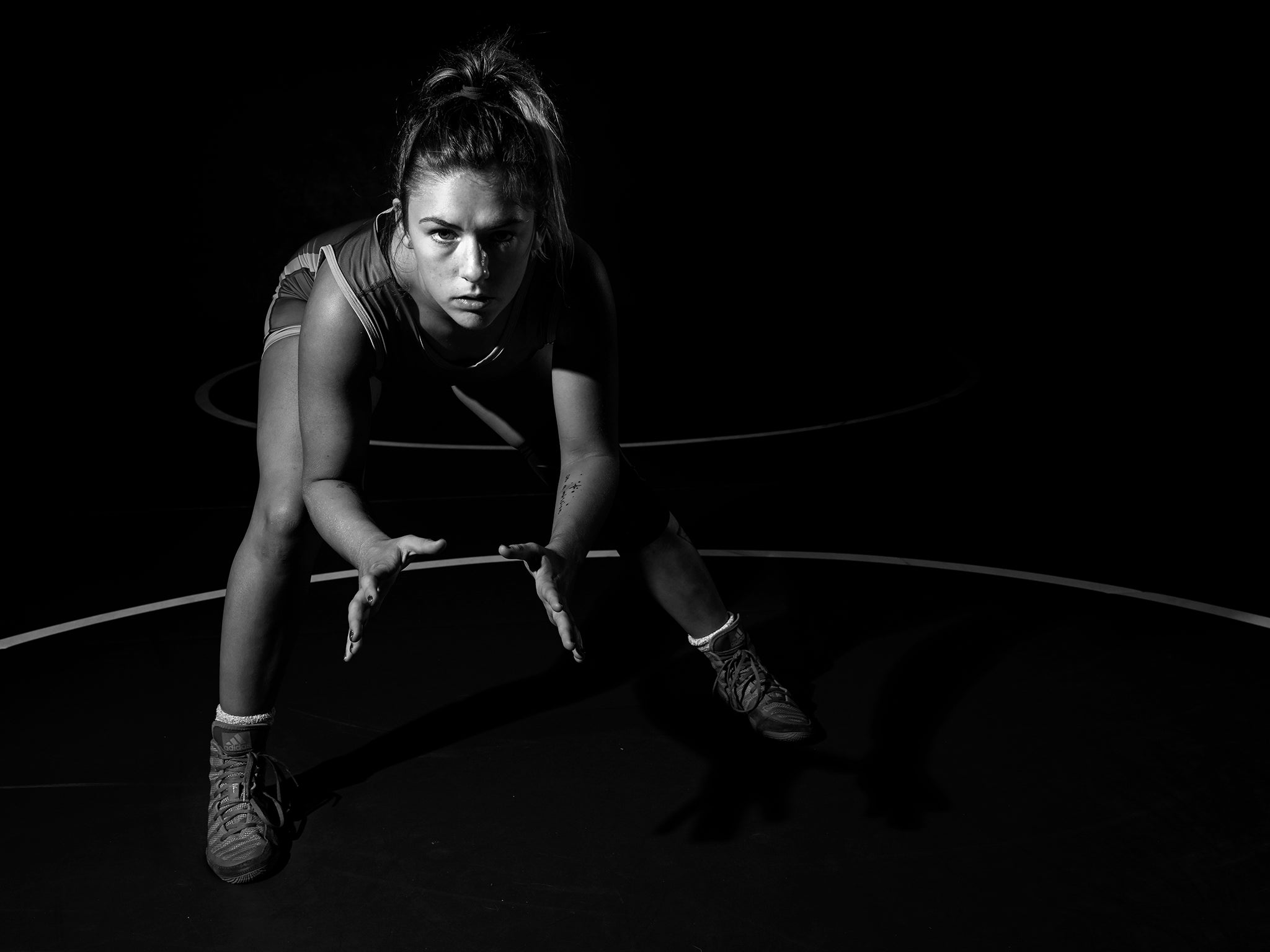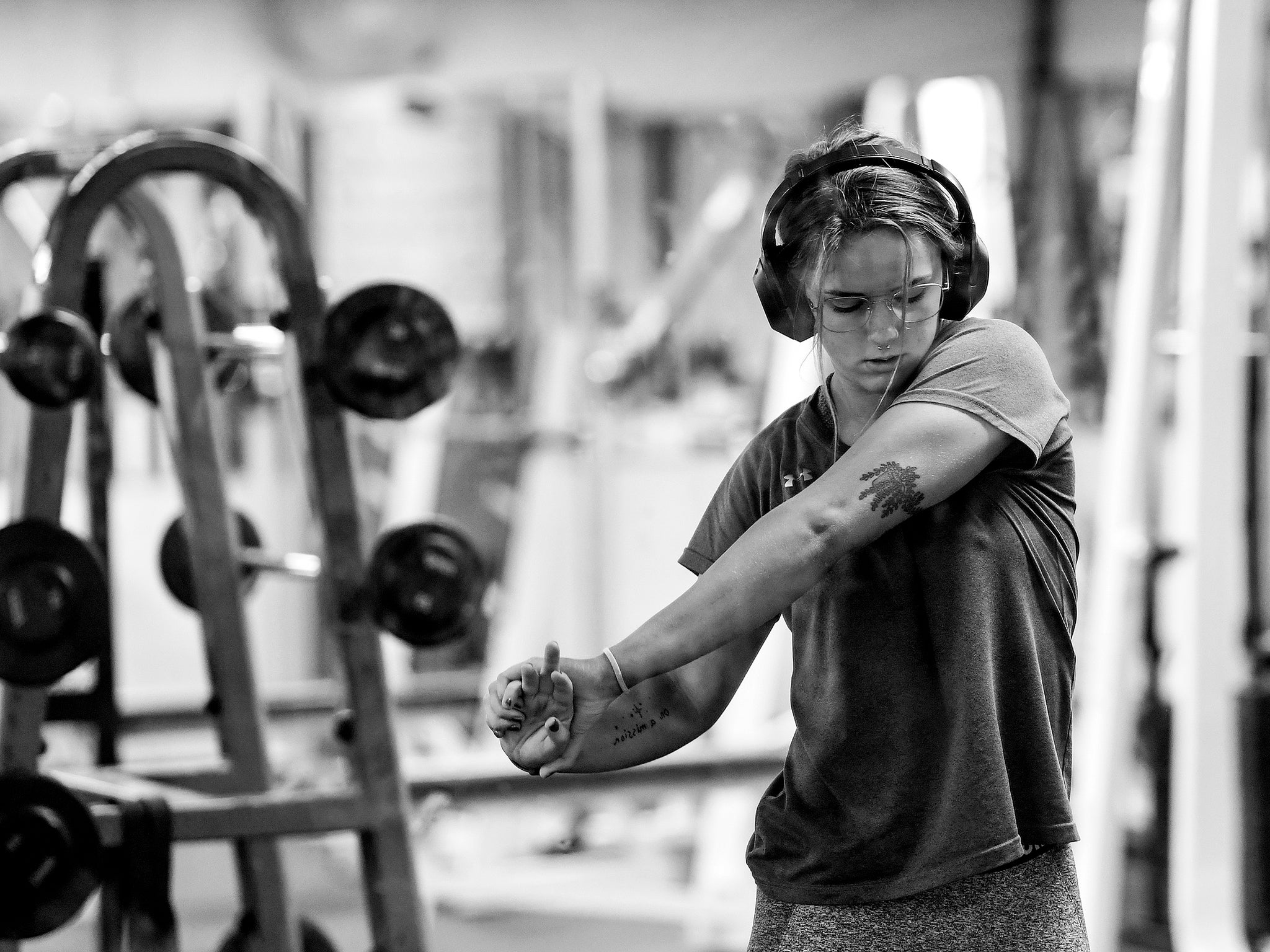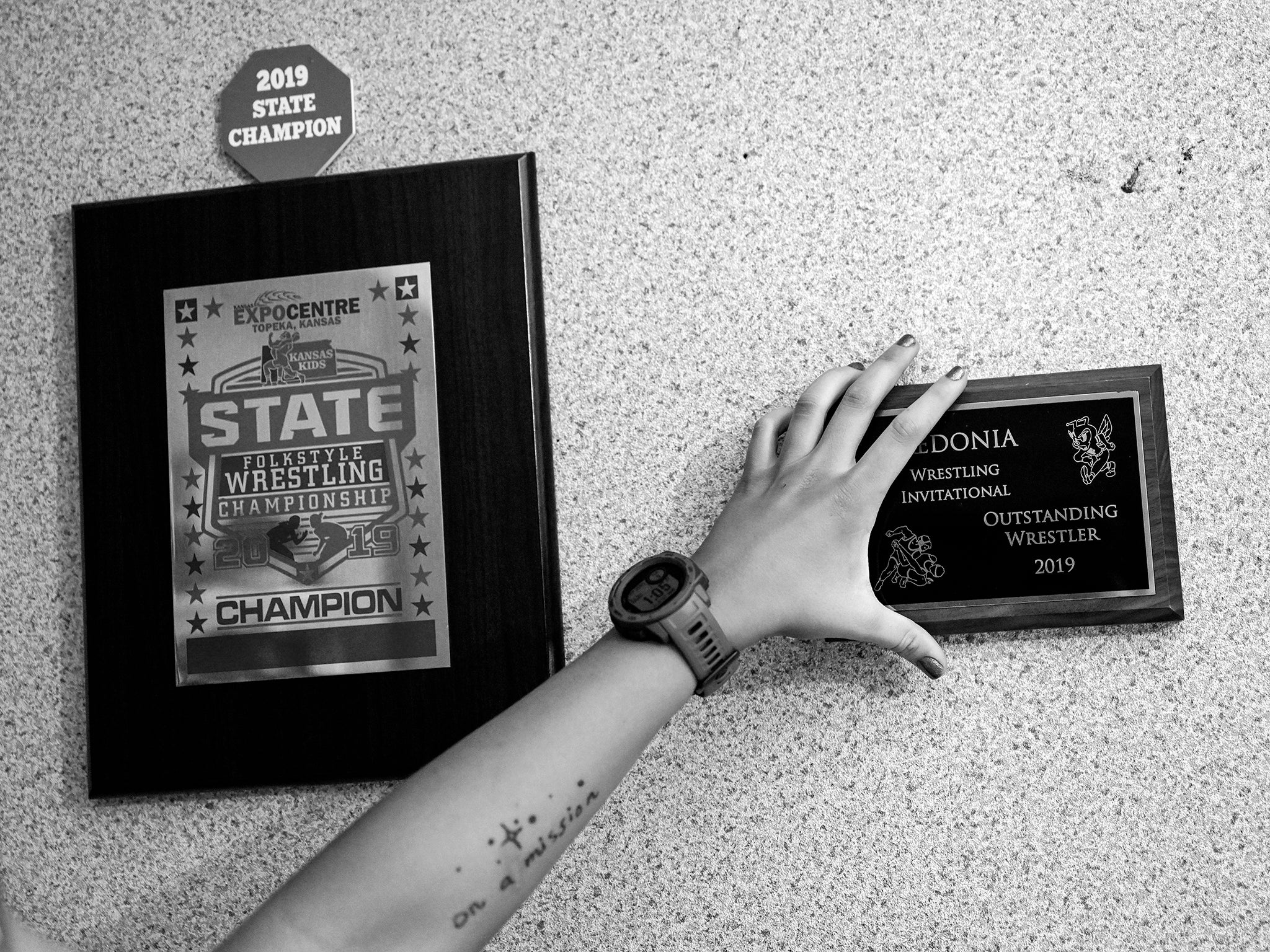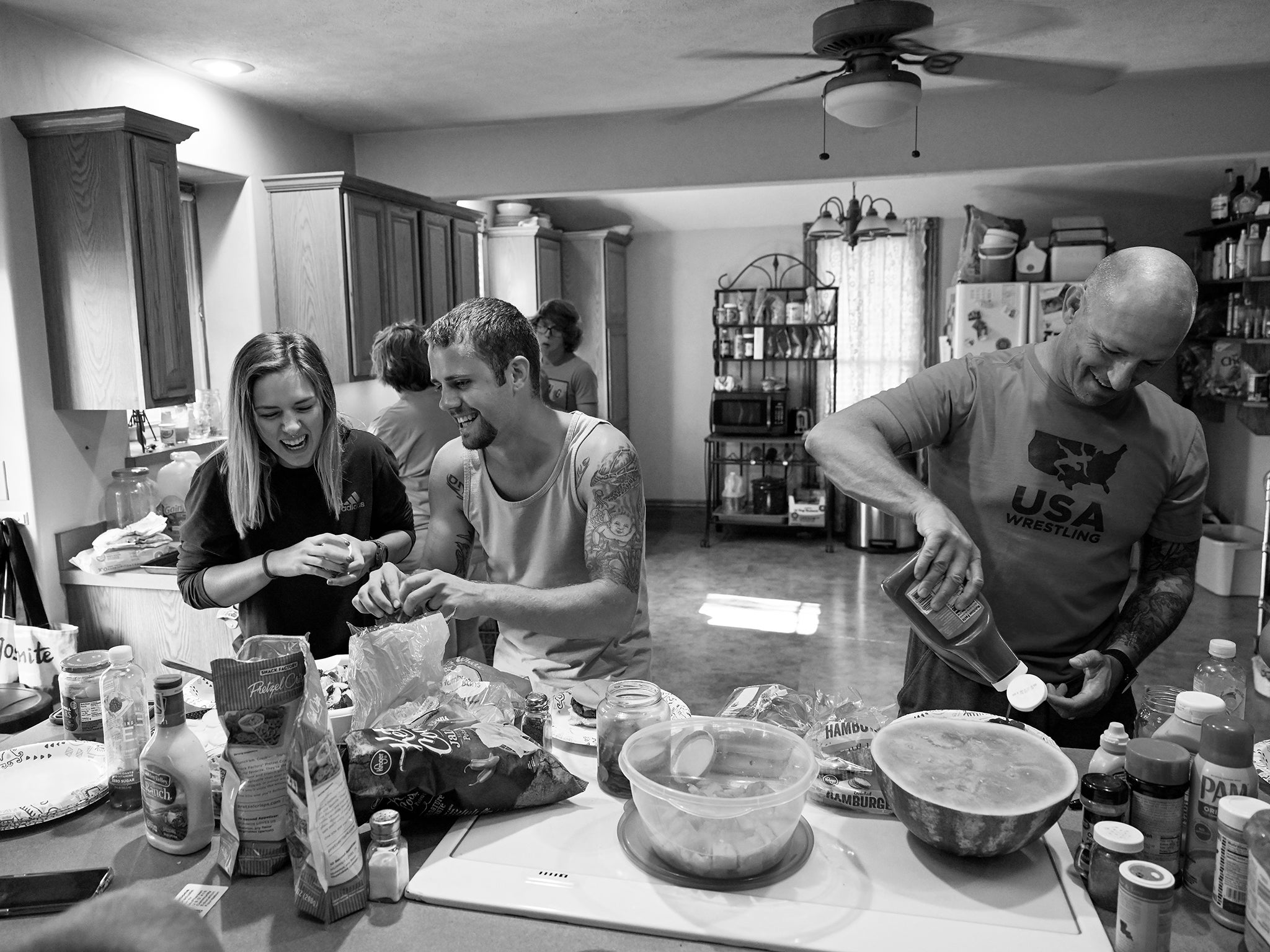How one high school student fought for women wrestlers everywhere and won
Blatant sexism has been a constant blight across the world of sports. Liz Clarke meets Mya Kretzer, who grew fed up and decided to do something about it

She was awkward at sports that involved rackets, balls or any kind of equipment. And the middle school girls she considered friends picked on her instead.
Finally fed up with being bullied, Mya Kretzer looked for a new crowd in seventh grade and found it in wrestling, a sport that ran through her family like strong winds whip through Kansas.
She loved wrestling’s demands: the discipline and commitment required to control an opponent using only skill, technique and grit. And if she had to practise and compete against sweaty boys, the chance to wrestle was worth it, she decided.
But no matter how much she improved, Kretzer soon realised she would never have a realistic chance to become a state champion.
She could compete and enter any tournament she chose. But because Kansas didn’t recognise girls’ wrestling as an official sport, she would have to beat the best boys in her weight class to win a state title – a virtual impossibility given the greater strength and muscle mass boys tend to develop as they get older.
What girls needed, she believed, was to have a sport of their own. Achieving that goal came to define her high-school wrestling career.
“Wrestling gives you what you need to be successful,” Kretzer explains. “It gives you dedication, commitment. It gives you somewhere where you belong. You can be your own self and be a total badass.”
Kretzer’s campaign to make girls’ wrestling an official high-school sport in Kansas – as it already was in California, Texas and 12 other states – began four years ago on a wrestling mat in McPherson, a town of 13,077 in central Kansas. But it speaks more broadly to female athletes’ ongoing struggle everywhere for full-fledged opportunity nearly a half century after the passage of Title IX, the federal law prohibiting discrimination on the basis of sex at schools that receive federal funds.

There’s no question Title IX revolutionised sports participation among girls and women in the United States. Since its passage in 1972, according to the National Federation of State High School Associations, the number of girls playing high school sports has grown more than 11-fold, from 294,000 in 1971 to 3.4 million last year.
“Without Title IX, we simply would not be here after decades and decades and decades of being told girls weren’t interested in sports or wouldn’t be very good if they played,” says Mary Jo Kane, director of the University of Minnesota’s Tucker Centre for Research on Girls and Women in Sport. “What we have found is that girls and women are deeply interested in playing sports if they are given an opportunity.”
For decades, however, female athletes have had to battle a hostile culture, if not outright bans, for that opportunity. Kretzer was hardly the first to lead the fight.
In 1967, distance runner Kathrine Switzer defied the Boston Marathon’s ban on female competitors with a brazen act, entering the race as simply “KV” Switzer.
Women’s marathon didn’t become an Olympic sport until 1984 – and only after the American College of Sports Medicine concluded there was no scientific or medical evidence that long-distance running posed health risks to trained female athletes
Once an official spotted her in the field of men, he lunged and tried to pull her off the course. But Switzer’s boyfriend, running alongside, shoved him aside, enabling her to finish the 26.2-mile race.
Nonetheless, women’s marathon didn’t become an Olympic sport until 1984 – and only after the American College of Sports Medicine concluded there was no scientific or medical evidence that long-distance running posed health risks to trained female athletes.
In 2008, female ski jumpers filed a lawsuit for the right to compete in the 2010 Vancouver Olympics after years of being denied a place in the Winter Games for reasons that kept changing.
“My favourite one is that [ski jumping] would damage our reproductive organs,” recalls Jessica Jerome of Park City, Utah, now 32, who was among the 15 international plaintiffs.
In 2009, the Supreme Court of British Columbia found that the athletes had been discriminated against but didn’t compel the International Olympic Committee to add women’s ski jumping to the Vancouver Games. Its debut came at the 2014 Winter Olympics in Sochi, where Jerome came 10th, the top-finishing American.

Heading into the 2022 Winter Olympics in Beijing, female ski jumpers still don’t have the same opportunity to compete as men. They’re restricted to the smaller of two jumps, while men can also compete on a hill that’s roughly 100ft taller.
There’s a similar inequity in Olympic race walking. While men compete at the 50km and 20km distances, women are restricted to the 20km distance.
Veteran American race walker Erin Taylor-Talcott has pushed for an opportunity to contest the 50km in the Olympics for years only to be told that women aren’t strong or fast enough to complete the distance in less than four hours. The argument: that allowing women in the race would create a logistical headache and that not enough women are interested anyway.
“Build it, and they will come,” Taylor-Talcott, who lives in Owego, New York, counters.
As the international Court of Arbitration for Sport considers a formal complaint on the inequity in the run-up to next summer’s Olympics in Tokyo, Taylor-Talcott continues training for a 50km race she may never get to contest while fending off personal attacks about her advocacy on social media.
Until very recently, females were stigmatised for having an interest in sports – and especially for having an interest in sports that have been closely identified with maleness
Her husband hails her as a pioneer in the tradition of Kathrine Switzer. Taylor-Talcott won’t go that far. “I’m just me,” she says. “I’m just Erin who likes to race walk. Why won’t you let me race 50km?”
The common thread in all these battles, Kane says, is the deep-seated cultural link between sports and maleness. For men and boys, the opportunity to play sports is a given, she says; for women and girls, it has been anything but.
“Until very recently, females were stigmatised for having an interest in sports – and especially for having an interest in sports that have been closely identified with maleness,” Kane says. “It makes logical sense, given that ideological structure and tradition of sports, that girls, as any minority group, constantly have to fight and re-fight battles for equality. Think about the energy that is expended by them to overcome the barriers put in their place.”
Mya Kretzer has no shortage of energy on the topic of wrestling.
In the crowded hallways of a high school, she might seem unremarkable – a girl of average height, at 5ft 4in, with blue-green eyes and a passion for glitter-red nail polish. But Kretzer can squat 200lb and bench press 118lb, just shy of her body weight. She has cultivated her inner warrior since she was 12.
“You can get this negativity loop in your head over trying to be what other people want you to be or trying to impress people. That’s a lot of what young girls think about, instead of being your own self,” says Kretzer, now 18. “Wrestling allows you to find yourself. With your wins and losses, you get to reflect and try to develop yourself into something better. It’s not something you practise for a few hours; it’s a 24/7, full commitment. The struggles in wrestling help you with the struggles outside of wrestling.”
Wrestling gives Kretzer purpose, just as it did her father, her two elder brothers and her twin brother, all of whom wrestled for McPherson High. It also gave her the personal motto that’s tattooed on her left forearm: “On a mission,” and inspired the clipper-ship tattoo on her left calf that reminds her she’s the captain of her own ship.
To that end, she logs her daily fitness routine in the wrestling journals she has kept for years. A recent entry included 150 sit-ups, 100 push-ups, 50 pull-ups, 100 bicycle crunches and 200 squats.

Wrestling dictates her meals, daily water consumption and regimen of vitamins C and B12 and CBD oil. It’s also a prerequisite for would-be boyfriends. “And they have to be my size, so I can wrestle them,” she says. “And I’m not kidding.”
Her bedroom is filled with wrestling trophies, medals, plaques, posters and her red and white McPherson Bullpups letter jacket covered with patches commemorating her powerlifting records, podium finishes and three victories in an unofficial state championship for girls.
Though plenty of girls in McPherson come from wrestling families and tried the sport as children at a local club, most give it up in adolescence. In Kretzer’s freshman year, she was one of just three girls on McPherson’s wrestling team.
The isolation was tough, at times.
At meets, where she wrestled boys if there were no girls in her weight class, she’d often have to hunt for a closet or vacant referee’s office to use as a changing room because the girls’ locker room was locked. Stepping onto the mat, she felt every sceptical eye on her. Worse, she couldn’t show the offensive skills she’d mastered because all her strength had to go into defence against boys who wrestled twice as hard against her to avoid being ridiculed for losing to a girl.
In so many ways, she felt this wasn’t fair. It wasn’t fair to girls, who generally couldn’t match the muscle mass of equal-sized boys. And it wasn’t fair to boys, who faced three options: throttle a girl, default if they felt uneasy about wrestling a girl or get mocked by their peers if they lost.
So as captain of her wrestling ship, Kretzer took on a double duty in her freshman year: to grow girls’ wrestling at McPherson and prove to the Kansas State High School Activities Association that there was enough interest to make girls’ wrestling an official sport in the state.
Her father, Doug Kretzer, who continues to juggle his job at an oil refinery with coaching McPherson’s wrestling team, vowed to do all he could to help.
“Until they have the ability to always compete against other females, we’re leaving tons of girls out who aren’t in the sport that otherwise might be,” he says.
With the backing of the school’s athletic director, Shane Backhus, the Kretzers developed a plan to bolster the ranks. They started with a simple idea: Get each girl on the team to recruit one other girl.
Key to their pitch was a promotional video produced by Wrestle Like a Girl, a nonprofit organisation founded by sports advocate Sally Roberts, a decorated former wrestler and Army combat veteran. The video features footage of girls of all ages and shapes training and competing, with a voiceover describing the traits of female wrestlers: “She is a dreamer, a trend setter, a barrier breaker. Powerful. Confident. Bold. Courageous.”
If I could wrestle with all these guys and keep up with them, I feel like I can run into a burning building and help people
It hooked Morgan Jones, who attended a wrestling team meeting at Mya Kretzer’s urging, saw the video and joined the squad. Jones says her confidence was shaky at that point, after she had idled on the bench much of her time on the McPherson’s girls’ basketball team. Through wrestling, she says, she gained a new sense of her ability. She started speaking up more in class and set her sights on becoming a firefighter.
“If I could wrestle with all these guys and keep up with them, I feel like I can run into a burning building and help people,” Jones says.
Meanwhile, Kretzer did all she could to win a state title – including shedding 20lbs in her junior year. She added swimming and cross-country to her workouts and eliminated nearly everything but fried eggs from her diet in the hope that competing at 106lb would give her a chance.
She joined her father at high-school wrestling coaches seminars around the state. He led breakout sessions on the potential of girls’ wrestling to grow the sport’s ranks and she followed with a personal appeal, looking each coach in the eye and asking him to promise to work with any girl who wanted to wrestle.
Backhus, McPherson’s athletic director, made a similar pitch to his peers, with a goal of getting 24 Kansas high schools to offer girls’ wrestling.
“When we sat down and started thinking about it and looked at every other sport, we don’t make the girls run against the boys in the 100m dash,” Backhus says. “We don’t make the girls play the boys during tennis season or compete against them in swim meets. It just made perfect sense.”
McPherson went a step further in 2017, hosting an unofficial Kansas state girls’ wrestling championship in the school’s storied Roundhouse gymnasium. The first year, 56 girls took part. The next year, 135. And last year, more than 220 competed.
The growth mirrors a national trend, according to Mike Moyer, executive director of the National Wrestling Coaches Association.

“What we have found is, typically high-school wrestling grows a lot faster when girls are competing against other girls and boys are competing against other boys,” Moyer says. “The challenge is, until you have enough critical mass, there is no alternative to having girls compete with boys. The quicker we can get to critical mass of young girls wrestling in every state, the quicker the growth will be accelerated.”
For Kretzer, making wrestling an official girls’ high-school sport in Kansas seemed an obvious solution – though it would take until this April, just weeks before her graduation, for the state high-school activities association to finally consider doing so.
Kretzer was excused early from school – skipping classes in medical technology and public speaking – to make the two-hour drive to Topeka with her father to attend the vote.
She had accomplished so much; she was so grateful for the overwhelming support. But she’d never benefit
Her own high-school wrestling career was over, her post-season cut short by a torn anterior cruciate ligament suffered in a tournament in Oklahoma. She hobbled into the packed boardroom with an ankle-to-thigh brace stabilising her surgically repaired left knee and took a seat in the section reserved for observers.
All stood for the Pledge of Allegiance, followed by a roll call of the school principals, athletic directors, coaches and administrators on the board of directors. With 65 present, 33 votes were needed to pass a proposal, and nearly 30 proposals were on the agenda.
Keeping quiet wasn’t easy in the cramped, low-ceilinged board room. Kretzer muttered under her breath and fidgeted in her seat, clutching her silenced mobile so she could blast the result to her McPherson teammates back home. And when the wrestling proposal finally came up, two hours into the proceedings, she gritted her teeth.
Doug Kretzer was asked to introduce the motion on girls’ wrestling, and he reviewed data about its growth in Kansas, as well as in neighbouring Missouri, where the number of female wrestlers jumped from 171 to more than 900 after the state sanctioned a high school post-season series for girls.

Debate followed, mainly about the wording of the resolution rather than its merits, and Kretzer could keep silent no more. She feared the discussion had bogged down in granular details and that the main point – what was fair for girls – was getting lost.
“Can I just say someth... ” she blurted out before being shushed by her father.
Several adults turned and stared, then resumed their discussion. It felt like an eternity.
Kretzer had spent her entire high-school years working for just this moment – and now the moment felt like years. Finally, they called for a vote.
When those in favour were asked to raise their hands, she looked up and scanned the room. Her face flushed red; her expression contorted.
The room was a sea of raised hands. The proposal passed, 63-2.
Her mind went blank, and tears fell.
“Happy tears?” she was asked at a whisper.
She took a breath, suddenly flooded with conflicting emotions.
She had accomplished so much; she was so grateful for the overwhelming support. But she’d never benefit. She’d never win a state title and have her name listed alongside those of McPherson’s past state champions in the school’s wrestling room. Maybe, she thought, her daughters would one day.
“Hard tears,” she whispered.
The Washington Post
Join our commenting forum
Join thought-provoking conversations, follow other Independent readers and see their replies
Comments
Bookmark popover
Removed from bookmarks